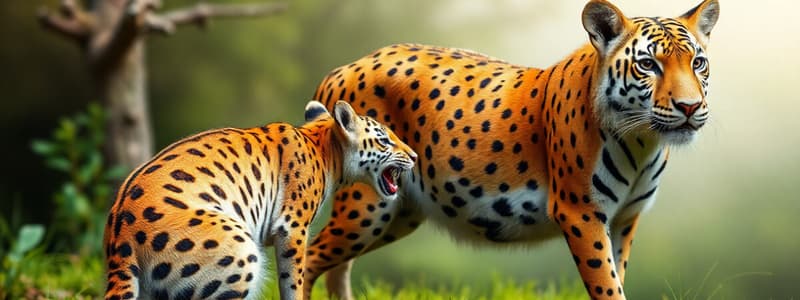Podcast
Questions and Answers
What is the primary focus of ethology in zoology?
What is the primary focus of ethology in zoology?
- Study of animal classifications
- Study of animal evolution
- Study of animal behavior (correct)
- Study of animal physiology
Which component of the taxonomic hierarchy comes directly after Kingdom?
Which component of the taxonomic hierarchy comes directly after Kingdom?
- Domain
- Phylum (correct)
- Class
- Order
What defines comparative anatomy?
What defines comparative anatomy?
- Study of animal communication methods
- Study of organ functions across species
- Study of evolutionary relationships
- Study of anatomical structures in different species (correct)
What type of studies observe animals in their natural habitats?
What type of studies observe animals in their natural habitats?
Which branch of zoology is focused on the study of fish?
Which branch of zoology is focused on the study of fish?
Who is known for developing the theory of evolution by natural selection?
Who is known for developing the theory of evolution by natural selection?
What aspect of zoology primarily addresses conservation of biodiversity?
What aspect of zoology primarily addresses conservation of biodiversity?
Which method utilizes genetics for species identification in zoology?
Which method utilizes genetics for species identification in zoology?
Flashcards are hidden until you start studying
Study Notes
Overview of Zoology
- Definition: Zoology is the scientific study of animals, their behavior, physiology, evolution, and taxonomy.
- Branches:
- Entomology: Study of insects.
- Herpetology: Study of reptiles and amphibians.
- Mammalogy: Study of mammals.
- Ornithology: Study of birds.
- Ichthyology: Study of fish.
- Ethology: Study of animal behavior.
- Comparative Anatomy: Study of similarities and differences in anatomy across species.
Key Concepts
- Classification: Organizing animals into categories based on shared characteristics.
- Taxonomic Hierarchy: Domain, Kingdom, Phylum, Class, Order, Family, Genus, Species.
- Evolution: Understanding the evolutionary relationships among animal species through phylogenetics and natural selection.
- Anatomy and Physiology:
- Anatomy: Structure of animal bodies (e.g., skeletal, muscular, circulatory systems).
- Physiology: Function of biological systems (e.g., respiration, digestion, reproduction).
Animal Behavior
- Instinct vs. Learning: Differentiating between innate behaviors and those acquired through experience.
- Communication: Methods in which animals convey information (e.g., vocalizations, body language, pheromones).
- Social Structures: Study of how animals interact within groups (e.g., packs, colonies, herds).
Ecology and Conservation
- Habitats: Environments where animals live (e.g., terrestrial, aquatic).
- Ecosystems: Interactions among various organisms and their environments.
- Conservation Biology: Focus on protecting biodiversity and endangered species.
Research Methods
- Field Studies: Observing animals in their natural habitats.
- Laboratory Studies: Controlled experiments to understand behavior and physiology.
- Molecular Techniques: Using genetics to study relationships and species identification.
Important Figures
- Charles Darwin: Developed the theory of evolution by natural selection.
- Jean-Baptiste Lamarck: Proposed early ideas on evolution and inheritance of acquired traits.
Current Trends
- Genomic Studies: Advances in DNA analysis to trace evolution and species relationships.
- Ethical Considerations: Discussions on animal welfare and ethical treatment in research and conservation.
Applications
- Agriculture: Understanding animal husbandry and breeding practices.
- Medicine: Studying animal models for human health research.
- Environmental Management: Using knowledge of animal behavior for conservation efforts.
Overview of Zoology
- Zoology is the scientific study focused on animals, examining behavior, physiology, evolution, and taxonomy.
- Major branches include:
- Entomology: Examines insects, the most diverse group of animals.
- Herpetology: Investigates reptiles and amphibians, studying their adaptations and ecology.
- Mammalogy: Focuses on mammals, including their physiology and taxonomy.
- Ornithology: Studies birds, their migratory patterns, and conservation.
- Ichthyology: Concerned with fish, exploring their biology and habitats.
- Ethology: Analyzes animal behavior, both innate and learned.
- Comparative Anatomy: Compares anatomical structures across different species to understand evolutionary relationships.
Key Concepts
- Classification organizes animals into categories based on shared characteristics, crucial for biological research.
- Taxonomic Hierarchy follows a structured system: Domain, Kingdom, Phylum, Class, Order, Family, Genus, Species.
- Evolution encompasses the study of species' relationships, utilizing phylogenetics and natural selection as core principles.
- Anatomy involves the structure of animal bodies, including their skeletal, muscular, and circulatory systems.
- Physiology examines biological functions, such as respiration, digestion, and reproduction processes.
Animal Behavior
- Instinct vs. Learning highlights the difference between innate behaviors and those learned through environmental interactions or experience.
- Communication in animals includes vocalizations, body language, and pheromones, facilitating information exchange.
- Social Structures are explored through the study of group interactions, such as the dynamics within packs, colonies, or herds.
Ecology and Conservation
- Habitats represent the natural environments where various animal species reside, classified into terrestrial and aquatic ecosystems.
- Ecosystems reveal the complex interactions among organisms and their environments, emphasizing energy flow and nutrient cycling.
- Conservation Biology focuses on protecting biodiversity and addressing the challenges faced by endangered species.
Research Methods
- Field Studies entail observing animals in their natural habitats to gather data on behavior and ecology.
- Laboratory Studies allow for controlled experiments, enhancing understanding of specific behavioral and physiological traits.
- Molecular Techniques involve using genetics to investigate species relationships and identify new species.
Important Figures
- Charles Darwin is renowned for developing the theory of evolution by natural selection, a foundational concept in biology.
- Jean-Baptiste Lamarck offered early evolution concepts, introducing ideas about the inheritance of acquired traits.
Current Trends
- Genomic Studies leverage DNA analysis advancements to trace evolutionary paths and understand species relationships better.
- Ethical Considerations are increasingly important in discussions about animal welfare, guiding the treatment of animals in research and conservation practices.
Applications
- Agriculture benefits from understanding animal husbandry and breeding practices, improving food production and sustainability.
- Medicine utilizes animal models in research to advance human health and understand diseases better.
- Environmental Management employs insights from animal behavior to enhance conservation strategies and protect ecosystems.
Studying That Suits You
Use AI to generate personalized quizzes and flashcards to suit your learning preferences.




